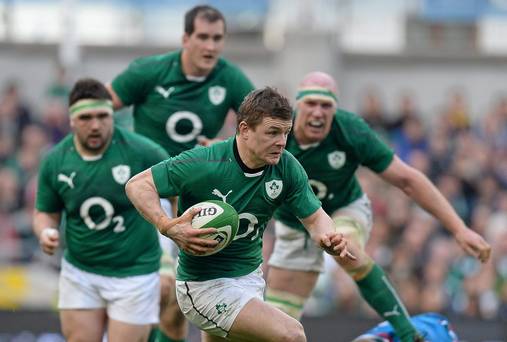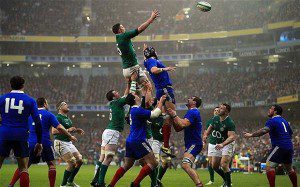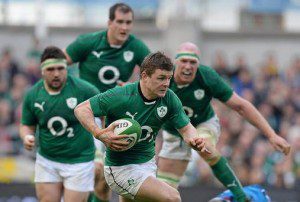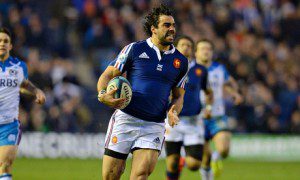

But France, too, will know what they will have to do. And it might be a long shot – but in a one-off match, the French are capable of anything… Well, most French sides, anyway. Maybe not this one. Actually, probably not this one. Almost certainly not this one.
Then again…
The final drama of the 2014 Six Nations was set up this weekend.

It was an impressive all-round performance from the Irish, who now enjoy a significant advantage in points difference over their rivals, and a loss (or draw) in Paris in the final round is all that can now realistically deny them the Six Nations title this year.
But O’Driscoll – on the assumption that France coach Philippe Saint-Andre selects to form – will face Les Bleus’ blunt instrument Mathieu Bastareaud. He won’t be allowed quite as much space as Michele Campagnaro did at the Aviva on Saturday. But he will be the centre of attention as he takes his final bow on the international stage.

With five minutes to go, their game – if it can be called such – had completely fallen apart. Their scrum was so dismal, Scotland were able to keep their starting props on the pitch. Their lineout was little more than a way to give the ball to the opposition; starting hooker Brice Mach was described in The Guardian as throwing like a drunken darts player. He missed his man six times in the first half and once more in the seven minutes he was on in the second.
Jules Plisson, who had showed such signs of promise in his first game against England, suffered rabbits-in-the-headlights indecision and chocolate fireguard ineffectiveness; Brice Dulin was comedically caught short twice – first when his ludicrous air dance with team-mate Yuann Huget gifted the Scots their first try, and second when he ran straight into one of his own players while in acres of space.
What’s almost incomprehensibly astonishing is that – amid this French farce – Scotland conspired to lose. The fact is they didn’t have the resolve of their opponents.
Beaten, bruised and humiliated, the French picked themselves up and found the will for one final rumble. They were rewarded with a kick to win a match they should lost long before. Would have lost long before against almost any other side. Jean-Marc Doussain, who had come on to replace Maxime Machenaud only four minutes earlier made no mistake, taking the scores to 17-19 with a minute to go.
France have been dogged by injuries, suspensions and the bizarre selections of Philippe Saint-Andre. They are all over the place tactically, sticking to a weird-ass gameplan that would be bonkers enough if it was in French but has apparently been written in a foreign language, but they are still in with a shout at the title. They just have to beat Ireland next week.


Gatland could argue that battle fatigue had finally caught up with his side, but this was not a full-strength England team. They were without Manu Tuilagi, Tom Croft, Dan Cole, Alex Corbisiero, Geoff Parling, Billy Vunipola and Marland Yarde.
With Courtney Lawes, Joe Launchbury, Mike Brown, Danny Care, Luther Burrell and Owen Farrell, who have all been consistently impressive in this championship, there is the nucleus of a team that could conceivably take on all-comers in next year’s World Cup.
That’s without mentioning Ben Morgan and Billy Twelvetrees, who must surely firmly be in coach Lancaster’s thinking.
But for a couple of cruel bounces in the opening 20 minutes of their first Six Nations game against France, next Saturday’s match against Italy in Rome would most likely have been a Grand Slam decider. As it is, Stuart Lancaster’s side will take their recent proud defensive record – just one try conceded in their last three Six Nations games (and that was Rob Kearney’s brilliant out-of-Leinster score) – to Stadio Olimpico, to face Italy who aren’t noted for their try-scoring prowess.
It’s to his credit that Gatland refused – directly at least – to blame the summer’s Lions tour of Australia for his side’s defeat, but he couldn’t deny they looked a weary, spent force against England’s spritely young guns. He admitted: “It has been tough on these players, with a grand slam, a championship, and a Lions’ tour, it has been a long 18 months.”
No kidding.
Comments? Thoughts? Questions? Let us know. Please also look for and “Like” our Facebook Rugby Wrap Up Page and follow us on Twitter @: RugbyWrapUp, Junoir Blaber, DJ Eberle, Nick Hall, James Harrington, Cody Kuxmann Declan Yeats and Karen Ritter respectively.

